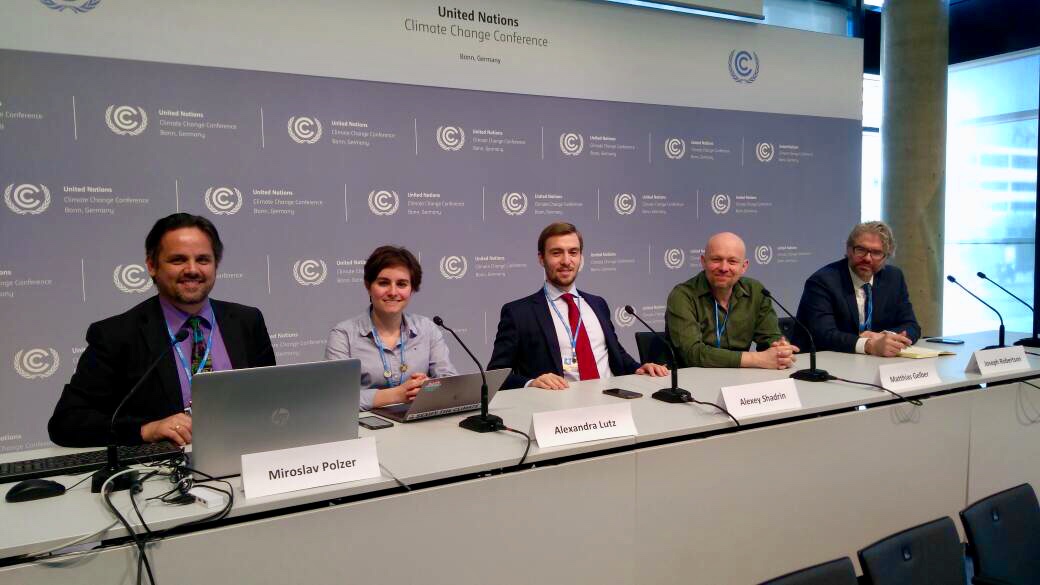DAO IPCI use cases presented to the UNFCC executives in Bonn
A swarm of drones measuring methane levels on the city dumps? People getting rewarded for solar energy use or their carbon footprint reduction? These are the realities of the near future, presented by DAO IPCI at the recent United Nations Climate Change Conference in Bonn.
“Carbon pollution is not free, and we should price it in a fair way to mitigate the third-party damage. Blockchain can help us solve this issue by eliminating the obstacles that prevent the green finance market from growing: the problems of trust, double counting, traceability and measurement of the environmental outcomes of climate projects”, said DAO IPCI co-founder Alexey Shadrin, explaining why the society needs blockchain to reach the Paris Agreement goals.
Since the moment of our presentation at COP23 in November 2017 DAO IPCI considerably advanced in its technical solutions. The results of this work were presented in Bonn at our exhibition booth, organized in partnership with Glocha, IEEI, Russian Carbon Fund and Evercity.
During the workshop "Blockchain Technology & Business Model Innovation for Enhanced Youth Engagement in Climate Action" and the Climate Chain Coalition Press Conference Alexey Shadrin stood up with a presentation covering three of our use cases.
The first one concerned Chile, where the organization runs the first distributed climate program for remote villages. Thanks to the smart sensors that measure energy generation by solar panels, the locals will be rewarded with tradable tokens generated on the blockchain, and this will contribute to the development of solar energy production.
Another important project is the blockchainization of the national system for monitoring and verification of GHG emissions in Kazakhstan. To implement the national Roadmap of transition to the green economy for 2013-2020 Kazakhstan needs to draw investments in clean technology and infrastructure, and this can be done thanks to national carbon market. The blockchain infrastructure of DAO IPCI is going to provide a digital environment for this transition. When completed, it will be the first ever national emissions monitoring and trading system operating on blockchain.
The third use case is carried on in technical cooperation with Airalab group to measure the methane emissions over rubbish dumps with the help of drones equipped with smart sensors (successfully tested in April). In the future the same method may be used to analyze the ecological safety of fracking which is now considered as a serious threat to environment.
“Robots can measure, manage and compensate environmental impact better than a human does,” said Sergei Lonshakov, DAO IPCI Chief Technology Officer
The concept and the projects in place were appreciated by Martin Frick, Senior Director for Policy and Programme Coordination of the United Nations Climate Change Secretariat. During the following bilateral meeting he expressed his overall approval of DAO IPCI’s initiatives and invited us to share our experience at COP24 conference in Poland.
“Blockchain technology is something new, and it’s something that personally fascinates me. It does a really humane thing by establishing trust between people who don’t even know each other and allowing peer-to-peer transactions. If we look many miles over the horizon and see individuals pay for the pollution, someone on the other end of the world would get this money directly without transaction cost, without any influence of bad governance. And getting the money for concrete, tangible and viable climate action, this would totally change the dynamics between rich and poor countries…” he said.
The representative of ICAO Stelios Pesmajoglou expressed his interest in the potential of DAO IPCI’s blockchain solution for the international carbon market for aviation. ICAO in cooperation with the aviation industry is currently engaged in various initiatives to reduce the carbon footprint of international aviation and mitigate the consequences of climate change. The climate policy of organization includes CO2 reductions trade, and DAO IPCI’s protocol would allow the necessary transparency and protection from double counting of emissions. The use cases have drawn attention from the representatives of the Egyptian delegation and the Indian corporation Mahindra which pledged emissions cut in line with the goals of Paris Agreement.
